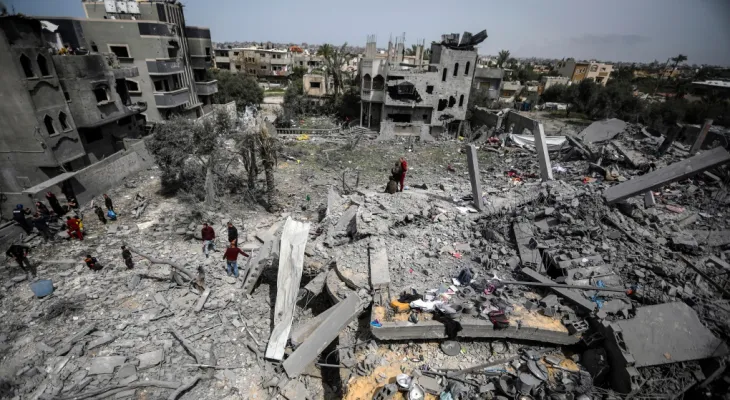Search here
Newspaper
Search here

Arab Canada News
News

Published: March 30, 2024
A convoy consisting of three ships left a port in Cyprus on Saturday loaded with 400 tons of food and other supplies for Gaza amid growing concerns about hunger in the enclave.
The World Central Kitchen said the ships and barges were carrying ready-to-eat items such as rice, pasta, flour, legumes, canned vegetables, and proteins sufficient to prepare more than a million meals, and the ship also had dates on board, traditionally eaten to break the daily fast during the holy month of Ramadan.
The "Open Arms" ship opened a direct sea route to the Palestinian territories earlier this month carrying 200 tons of food, water, and other aid.
The United Nations and its partners warned of a potential famine in northern Gaza, which is largely destroyed and isolated, earlier this month. Humanitarian officials say deliveries by sea and air are insufficient and that Israel must allow more aid through land crossings. The UN Supreme Court ordered Israel to open more land crossings and take other measures to address the humanitarian crisis.
Meanwhile, the United States welcomed the formation of a new Palestinian self-rule government, noting it accepts the revised cabinet as a step towards political reform.
The Biden administration called for "revitalizing" the Palestinian Authority in the West Bank, hoping it can also manage the Gaza Strip once the war between Israel and Hamas ends. It is headed by Palestinian President Mahmoud Abbas, who appointed economist Mohammad Mustafa, educated in the United States, as Prime Minister earlier this month.
But both Israel and Hamas - which expelled Abbas’s security forces from Gaza in its 2007 takeover - reject the idea of managing Gaza, and Hamas rejects the formation of the new Palestinian government as illegitimate. The authority also has little popular support or legitimacy among Palestinians due to its security cooperation with Israel in the West Bank.
The war began after militants led by Hamas swept across southern Israel on October 7, killing 1,200 people, mostly civilians, and taking about 250 others hostage.
More than 400 Palestinians have been killed by Israeli forces or settlers in the West Bank or East Jerusalem since October 7, according to local health authorities. Dr. Fawaz Hamad, director of Al-Razi Hospital in Jenin, told the local Awdah channel that Israeli forces killed a 13-year-old boy in nearby Qabatiya early on Saturday. The Israeli army said the incident is under review.
The main challenge facing anyone managing Gaza is reconstruction. The war, ongoing for nearly six months, has destroyed vital infrastructure including hospitals, schools, homes as well as roads, sewage systems, and the electricity network.
Local health authorities said on Saturday that Israeli air strikes and ground attacks have resulted in 32,705 Palestinian deaths, and 82 bodies have been transferred to hospitals in the past 24 hours. The Ministry of Health in Gaza does not differentiate between civilians and fighters in its death toll but said the majority of the dead were women and children.
Israel says more than a third of the dead are militants, although it has not provided evidence to support this, blaming Hamas for civilian casualties because the group operates in residential areas.
The United Nations and international relief agencies say the fighting has displaced more than 80% of Gaza’s population and pushed hundreds of thousands to the brink of famine. The Israeli military said it continued striking dozens of targets in Gaza, days after the UN Security Council issued its first demand for a ceasefire.
Aid has also fallen on Gaza. The U.S. military said during an airdrop operation on Friday that it released more than 100,000 pounds of aid that day and about a million pounds in total as part of a multi-country effort.
Israel said it will maintain open security control over Gaza after the war and cooperate with Palestinians not affiliated with the Palestinian Authority or Hamas. It is unclear who in Gaza would be willing to undertake such a role.
Hamas warned Palestinians in Gaza against cooperating with Israel to manage the enclave, saying anyone who does will be treated as a collaborator, which is understood as a death threat. Instead, Hamas calls on all Palestinian factions to form a government to share power ahead of national elections that have not been held for 18 years.
Comments